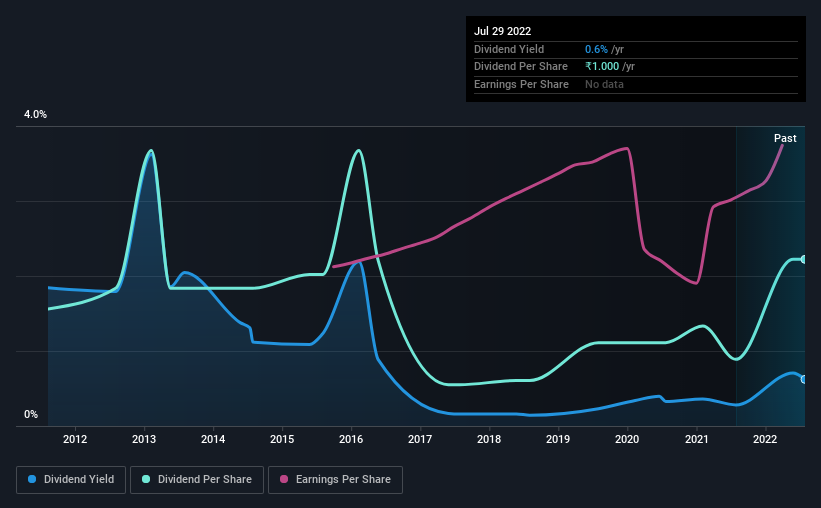City Union Bank (NSE:CUB) Is Paying Out A Larger Dividend Than Last Year

City Union Bank Limited's (NSE:CUB) dividend will be increasing from last year's payment of the same period to ₹1.00 on 17th of September. Even though the dividend went up, the yield is still quite low at only 0.6%.
View our latest analysis for City Union Bank
City Union Bank's Earnings Will Easily Cover The Distributions
It would be nice for the yield to be higher, but we should also check if higher levels of dividend payment would be sustainable.
City Union Bank has established itself as a dividend paying company with over 10 years history of distributing earnings to shareholders. While past records don't necessarily translate into future results, the company's payout ratio of 9.7% also shows that City Union Bank is able to comfortably pay dividends.
Looking forward, earnings per share is forecast to rise by 17.5% over the next year. Assuming the dividend continues along recent trends, we think the future payout ratio could be 8.4% by next year, which is in a pretty sustainable range.

Dividend Volatility
While the company has been paying a dividend for a long time, it has cut the dividend at least once in the last 10 years. Since 2012, the annual payment back then was ₹0.703, compared to the most recent full-year payment of ₹1.00. This implies that the company grew its distributions at a yearly rate of about 3.6% over that duration. It's encouraging to see some dividend growth, but the dividend has been cut at least once, and the size of the cut would eliminate most of the growth anyway, which makes this less attractive as an income investment.
City Union Bank Could Grow Its Dividend
With a relatively unstable dividend, it's even more important to evaluate if earnings per share is growing, which could point to a growing dividend in the future. We are encouraged to see that City Union Bank has grown earnings per share at 8.2% per year over the past five years. A low payout ratio and decent growth suggests that the company is reinvesting well, and it also has plenty of room to increase the dividend over time.
We Really Like City Union Bank's Dividend
Overall, we think this could be an attractive income stock, and it is only getting better by paying a higher dividend this year. The company is easily earning enough to cover its dividend payments and it is great to see that these earnings are being translated into cash flow. All in all, this checks a lot of the boxes we look for when choosing an income stock.
Investors generally tend to favour companies with a consistent, stable dividend policy as opposed to those operating an irregular one. Still, investors need to consider a host of other factors, apart from dividend payments, when analysing a company. Case in point: We've spotted 2 warning signs for City Union Bank (of which 1 is significant!) you should know about. If you are a dividend investor, you might also want to look at our curated list of high yield dividend stocks.
If you're looking to trade City Union Bank, open an account with the lowest-cost platform trusted by professionals, Interactive Brokers.
With clients in over 200 countries and territories, and access to 160 markets, IBKR lets you trade stocks, options, futures, forex, bonds and funds from a single integrated account.
Enjoy no hidden fees, no account minimums, and FX conversion rates as low as 0.03%, far better than what most brokers offer.
Sponsored ContentNew: AI Stock Screener & Alerts
Our new AI Stock Screener scans the market every day to uncover opportunities.
• Dividend Powerhouses (3%+ Yield)
• Undervalued Small Caps with Insider Buying
• High growth Tech and AI Companies
Or build your own from over 50 metrics.
Have feedback on this article? Concerned about the content? Get in touch with us directly. Alternatively, email editorial-team (at) simplywallst.com.
This article by Simply Wall St is general in nature. We provide commentary based on historical data and analyst forecasts only using an unbiased methodology and our articles are not intended to be financial advice. It does not constitute a recommendation to buy or sell any stock, and does not take account of your objectives, or your financial situation. We aim to bring you long-term focused analysis driven by fundamental data. Note that our analysis may not factor in the latest price-sensitive company announcements or qualitative material. Simply Wall St has no position in any stocks mentioned.
About NSEI:CUB
City Union Bank
Engages in the provision of various banking products and services to personal and corporate clients in India.
Adequate balance sheet average dividend payer.
Similar Companies
Market Insights
Community Narratives




